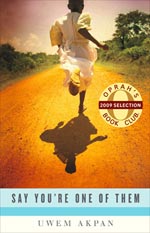
Say You’re One of Them

His biography is what you’ll remember: Uwem Akpan, born and raised in Nigeria, who learned to tell stories via the storytelling tradition in his village, is an ordained Jesuit priest, earned an MFA from the highly competitive University of Michigan program, sold his first story to the New Yorker in 2005, and landed a book deal from Little, Brown for this collection for a rumored one million dollars. It’s a personal back story that, while inspirational for sure, was meant to be sold. For one million dollars. I would be less cynical about this if the collection boasted stories that equaled Akpan’s history in scope and style.
Unfortunately, it doesn’t. The five long stories (novellas, really) are told from the points of view of children from five different African nations, all enmeshed in plotlines about child sex trafficking, starvation, poverty, prostitution, and war. They are brutal (or, as Oprah repeats in her blog entry, “searing!”) and relentless. But the brutality stands in for passion. Relentlessness substitutes for evocation. The collection, featuring innocents across the continent, reads more as pan-African docu-fiction—a commercial for generic African tragedy—instead of fresh perspectives on highly charged and trodden topics.

Uwem Akpan (By Comfort Upkong)
This is not to say that Akpan isn’t talented. He is. The story “My Parents’ Bedroom,” which appeared in the New Yorker in 2006, has stayed with me all these years. However, what has stayed is not the way the story was told, but the horror of what happens. In that piece, a half-Tutsi and half-Hutu Rwandan family hides dying refugees in the attic, and at the close of the story, the ceiling literally begins to bleed. This leads to one of the few remarkable lines in the book: “the pipes whistle and sigh, but today it feels as if I were hearing blood flowing through the strange veins of ghosts.” I only wish the rest of the stories had opened up as much.
It’s also not as if there aren’t several collections that have appeared in the last few years worthy of Oprah’s attention. It’s also not as if there aren’t others equally topical. A young Nigerian woman, Chimamanda Ngozi Adichie, has written both a novel and a collection about Nigerians and Nigerian-Americans. Not only did she win the MacArthur fellowship in 2008, but her stories are quietly affecting. Most importantly, she does not let her own biography do the work of real writing.
Yet, as is to be expected from a talk show host’s book club, veracity is paramount to artfulness. The spectacle with Akpan is that this is true instead of this is beautiful. But I’m wondering what ever happened to the value of this is true because this is beautiful. Isn’t that worth a million dollars, or at least an Oprah video blog entry?
